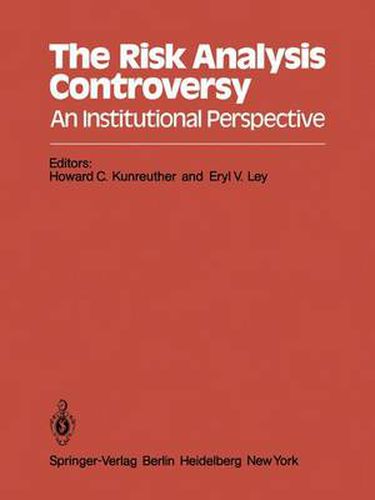Readings Newsletter
Become a Readings Member to make your shopping experience even easier.
Sign in or sign up for free!
You’re not far away from qualifying for FREE standard shipping within Australia
You’ve qualified for FREE standard shipping within Australia
The cart is loading…






This title is printed to order. This book may have been self-published. If so, we cannot guarantee the quality of the content. In the main most books will have gone through the editing process however some may not. We therefore suggest that you be aware of this before ordering this book. If in doubt check either the author or publisher’s details as we are unable to accept any returns unless they are faulty. Please contact us if you have any questions.
The first summer study at IIASA brought together a cross-section of individ uals from different disciplines and nationalities. All the participants have had an interest in the role of risk analysis given the institutional arrangements which guide decision making for new technologies. This book contains edited versions of the papers presented at the meeting as well as a transcript of the discussions which took place. It provides the ingredients for a broader framework fcr studying the problems associated with technology and society where risk is representative of a much wider set of concerns than simply the probability and consequences of a hazardous accident. The Bundesministerium fuer Forschung und Technologie has an interest in promoting risk and safety research because of these new developments in society over the past ten years. In particular, there has been a diminished confidence in experts’ statements on risk and a realization that many of the events which are being examined are not subject to detailed scientific analysis. There has also been an increasing recognition that distinctions must be made between analysis of the risk associated with an event and people’s values and preferences. Another important development is the concern by the public that they participate more fully in the decision process on these issues. These concerns were articulated in both the papers and the open discussions at the summer study.
$9.00 standard shipping within Australia
FREE standard shipping within Australia for orders over $100.00
Express & International shipping calculated at checkout
This title is printed to order. This book may have been self-published. If so, we cannot guarantee the quality of the content. In the main most books will have gone through the editing process however some may not. We therefore suggest that you be aware of this before ordering this book. If in doubt check either the author or publisher’s details as we are unable to accept any returns unless they are faulty. Please contact us if you have any questions.
The first summer study at IIASA brought together a cross-section of individ uals from different disciplines and nationalities. All the participants have had an interest in the role of risk analysis given the institutional arrangements which guide decision making for new technologies. This book contains edited versions of the papers presented at the meeting as well as a transcript of the discussions which took place. It provides the ingredients for a broader framework fcr studying the problems associated with technology and society where risk is representative of a much wider set of concerns than simply the probability and consequences of a hazardous accident. The Bundesministerium fuer Forschung und Technologie has an interest in promoting risk and safety research because of these new developments in society over the past ten years. In particular, there has been a diminished confidence in experts’ statements on risk and a realization that many of the events which are being examined are not subject to detailed scientific analysis. There has also been an increasing recognition that distinctions must be made between analysis of the risk associated with an event and people’s values and preferences. Another important development is the concern by the public that they participate more fully in the decision process on these issues. These concerns were articulated in both the papers and the open discussions at the summer study.